- Home
- Dave Eggers
The Monk of Mokha
The Monk of Mokha Read online
Also by Dave Eggers
FICTION
Heroes of the Frontier
Your Fathers, Where Are They? And the Prophets, Do They Live Forever?
The Circle
A Hologram for the King
What Is the What
How We Are Hungry
You Shall Know Our Velocity!
MEMOIR
A Heartbreaking Work of Staggering Genius
NONFICTION
American Carnage, Pt. 1
Understanding the Sky
Zeitoun
AS EDITOR
Surviving Justice: America’s Wrongfully Convicted and Exonerated (with Dr. Lola Vollen)
The Voice of Witness Reader: Ten Years of Amplifying Unheard Voices
FOR YOUNG READERS
The Wild Things
This Bridge Will Not Be Gray
Her Right Foot
The Lifters
THIS IS A BORZOI BOOK PUBLISHED BY ALFRED A. KNOPF AND ALFRED A. KNOPF CANADA
Copyright © 2018 by Dave Eggers
All rights reserved. Published in the United States by Alfred A. Knopf, a division of Penguin Random House LLC, New York, and in Canada by Alfred A. Knopf Canada, a division of Penguin Random House Canada Limited, Toronto.
www.aaknopf.com
www.penguinrandomhouse.ca
Knopf, Borzoi Books, and the colophon are registered trademarks of Penguin Random House LLC. Knopf Canada and colophon are trademarks of Penguin Random House Canada Limited.
Library of Congress Cataloging-in-Publication Data
Names: Eggers, Dave, author.
Title: The monk of Mokha / by Dave Eggers.
Description: First edition. | New York : Alfred A. Knopf, 2018.
Identifiers: LCCN 2017032893| ISBN 9781101947319 (hardcover) | ISBN 9781101947326 (ebook) | ISBN 978110947319 (open market)
Subjects: LCSH: Alkhanshali, Mokhtar. | Coffee industry—California—San Francisco. | Businesspeople—California—San Francisco—Biography. | Yemeni Americans—California—San Francisco—Biography. | Alkhanshali, Mokhtar—Travel—Yemen (Republic) | Coffee industry—Yemen (Republic)
Classification: LCC HD9199.U48 .E34 2018 | DDC 338.7/66393092 [B]—dc23 LC record available at https://lccn.loc.gov/2017032893
Ebook ISBN 9781101947326
Cover illustration by Shawn Harris
Map by Jeffrey L. Ward
v5.1
ep
Contents
Cover
Also by Dave Eggers
Title Page
Copyright
Epigraph
Map
Prologue
A Note About This Book
Book I
Chapter I: The Satchel
Chapter II: Doorman at the Infinity
Chapter III: The Kid Who Stole Books
Chapter IV: Sage Advice from Ghassan Toukan
Chapter V: Yemen
Chapter VI: Rupert, Arriviste
Chapter VII: Rupert Sells Hondas
Chapter VIII: Richgrove Agonistes
Chapter IX: The Button
Book II
Chapter X: The Statue
Chapter XI: The Plan
Chapter XII: Sage Advice from Ghassan Toukan
Chapter XIII: Past Pretense
Chapter XIV: The Basics
Chapter XV: The C Market and the Three Waves
Chapter XVI: The Plan
Chapter XVII: Stealing Coffee Back from the Dutch
Chapter XVIII: The Apprentices
Chapter XIX: Passing the Q
Book III
Chapter XX: Hamood and Hubayshi
Chapter XXI: A Dream in Different Clothing
Chapter XXII: Point of Departure
Chapter XXIII: Out of Sana’a
Chapter XXIV: This One’s Interesting
Chapter XXV: A Country Without a Government
Chapter XXVI: Money in Your Hand, Not in Your Heart
Chapter XXVII: The Americans
Book IV
Chapter XXVIII: Bedlam
Chapter XXIX: Mountains on Fire
Chapter XXX: The Summer Ship
Chapter XXXI: The Road to Aden
Chapter XXXII: Aden Welcomes You
Chapter XXXIII: Other Mokhtar
Chapter XXXIV: A Quick Death from a Clean Blade
Chapter XXXV: A Gentle Hand
Chapter XXXVI: Six Armed Men at the Foot of the Bed
Chapter XXXVII: The Port of Mokha
Chapter XXXVIII: Djibouti Welcomes You
Book V
Chapter XXXIX: Return to the Infinity
Chapter XL: Coffee on the Water
Chapter XLI: The Luciana
Chapter XLII: The Doormen Unite and Open the Roof
Epilogue
Acknowledgments
About the Author
The Mokha Foundation
Reading Group Guide
And why? Because he let the entire world press upon him. For instance? Well, for instance, what it means to be a man. In a city. In a century. In transition. In a mass. Transformed by science. Under organized power. Subject to tremendous controls. In a condition caused by mechanization. After the late failure of radical hopes. In a society that was no community and devalued the person. Owing to the multiplied power of numbers which made the self negligible. Which spent military billions on foreign enemies but would not pay for order at home. Which permitted savagery and barbarism in its own great cities. At the same time, the pressure of human millions who have discovered what concerted efforts and thoughts can do. As megatons of water shape organisms on the ocean floor. As tides polish stones. As winds hollow cliffs. The beautiful supermachinery opening a new life for innumerable mankind.
—Saul Bellow, Herzog
PROLOGUE
MOKHTAR ALKHANSHALI AND I agree to meet in Oakland. He has just returned from Yemen, having narrowly escaped with his life. An American citizen, Mokhtar was abandoned by his government and left to evade Saudi bombs and Houthi rebels. He had no means to leave the country. The airports had been destroyed and the roads out of the country were impassable. There were no evacuations planned, no assistance provided. The United States State Department had stranded thousands of Yemeni Americans, who were forced to devise their own means of fleeing a blitzkrieg—tens of thousands of U.S.-made bombs dropped on Yemen by the Saudi air force.
I wait for Mokhtar (pronounced MŌKH-tar) outside Blue Bottle Coffee in Jack London Square. Elsewhere in the United States, there is a trial under way in Boston, where two young brothers have been charged with setting off a series of bombs during the Boston Marathon, killing nine and wounding hundreds. High above Oakland, a police helicopter hovers, monitoring a dockworkers’ strike going on at the Port of Oakland. This is 2015, fourteen years after 9/11, and seven years into the administration of President Barack Obama. As a nation we had progressed from the high paranoia of the Bush years; the active harassment of Muslim Americans had eased somewhat, but any crime perpetrated by any Muslim American fanned the flames of Islamophobia for another few months.
When Mokhtar arrives, he looks older and more self-possessed than the last time I’d seen him. The man who gets out of the car this day is wearing khakis and a purple sweater-vest. His hair is short and gelled, and his goatee is neatly trimmed. He walks with a preternatural calm, his torso barely moving as his legs carry him across the street and to our table on the sidewalk. We shake hands, and on his right hand, I see that he wears a large silver ring, spiderwebbed with detailed markings, a great ruby-red stone set into it.
He ducks into Blue Bottle to say hello to friends working inside, and to bring me a cup of coffee from Ethiopia. He insists I wait till it cools to drink it. Coffee should not be
enjoyed too hot, he says; it masks the flavor, and taste buds retreat from the heat. When we’re finally settled and the coffee has cooled, he begins to tell his story of entrapment and liberation in Yemen, and of how he grew up in the Tenderloin district of San Francisco—in many ways the city’s most troubled neighborhood—how, while working as a doorman at a high-end apartment building downtown, he found his calling in coffee.
Mokhtar speaks quickly. He is very funny and deeply sincere, and illustrates his stories with photos he’s taken on his smartphone. Sometimes he plays the music he listened to during a particular episode of his story. Sometimes he sighs. Sometimes he wonders at his existence, his good fortune, being a poor kid from the Tenderloin who now has found some significant success as a coffee importer. Sometimes he laughs, amazed that he is not dead, given he lived through a Saudi bombing of Sana’a, and was held hostage by two different factions in Yemen after the country fell to civil war. But primarily he wants to talk about coffee. To show me pictures of coffee plants and coffee farmers. To talk about the history of coffee, the overlapping tales of adventure and derring-do that brought coffee to its current status as fuel for much of the world’s productivity, and a seventy-billion-dollar global commodity. The only time he slows down is when he describes the worry he caused his friends and family when he was trapped in Yemen. His large eyes well up and he pauses, staring at the photos on his phone for a moment before he can compose himself and continue.
—
Now, as I finish this book, it’s been three years since our meeting that day in Oakland. Before embarking on this project, I was a casual coffee drinker and a great skeptic of specialty coffee. I thought it was too expensive, and that anyone who cared so much about how coffee was brewed, or where it came from, or waited in line for certain coffees made certain ways, was pretentious and a fool.
But visiting coffee farms and farmers around the world, from Costa Rica to Ethiopia, has educated me. Mokhtar educated me. We visited his family in California’s Central Valley, and we picked coffee cherries in Santa Barbara—at North America’s only coffee farm. We chewed qat in Harar, and in the hills above the city we walked amid some of the oldest coffee plants on earth. In retracing his steps in Djibouti, we visited a dusty and hopeless refugee camp near the coastal outpost of Obock, and I watched as Mokhtar fought to recover the passport of a young Yemeni dental student who had fled the civil war and had nothing—not even his identity. In the most remote hills of Yemen, Mokhtar and I drank sugary tea with botanists and sheiks, and heard the laments of those who had no stake in the civil war and only wanted peace.
After all this, American voters elected—or the electoral college made possible—the presidency of a man who had promised to exclude all Muslims from entering the country—“until we figure out what’s going on,” he said. After inauguration, he made two efforts to ban travel to the United States by citizens of seven Muslim-majority nations. On this list was Yemen, a country more misunderstood than perhaps any other. “I hope they have wifi in the camps,” Mokhtar said to me after the election. It was a grim joke making the rounds in the Muslim American community, based on the presumption that Trump will, at the first opportunity—if there is a domestic terror incident propagated by a Muslim, for instance—propose the registry or even internment of Muslims in America. When he made the joke, Mokhtar was wearing a T-shirt that read MAKE COFFEE, NOT WAR.
Mokhtar’s sense of humor pervades everything he does and says, and in these pages I hope to have captured it and how it informs the way he sees the world, even at its most perilous. At one point during the Yemeni civil war, Mokhtar was captured and held in prison by a militia in Aden. Because he was raised in the United States and is steeped in American pop culture, it occurred to him that one of his captors looked like the Karate Kid; when Mokhtar recounted the episode to me, he called the captor the Karate Kid and nothing else. By using this nickname, I don’t mean to understate the danger Mokhtar was in, but feel it’s important to reflect the outlook of a man who is uniquely difficult to rattle, and who sees most dangers as only temporary impediments to more crucial concerns—the finding, roasting and importing of Yemeni coffee, and the progress of the farmers for whom he fights. And my guess is that this captor did look like the Ralph Macchio of the early 1980s.
Mokhtar is both humble before the history he inhabits and irreverent about his place in it. But his story is an old-fashioned one. It’s chiefly about the American Dream, which is very much alive and very much under threat. His story is also about coffee, and about how he tried to improve coffee production in Yemen, where coffee cultivation was first undertaken five hundred years ago. It’s also about the Tenderloin neighborhood of San Francisco, a valley of desperation in a city of towering wealth, about the families that live there and struggle to live there safely and with dignity. It’s about the strange preponderance of Yemenis in the liquor-store trade of California, and the unexpected history of Yemenis in the Central Valley. And how their work in California echoes their long history of farming in Yemen. And how direct trade can change the lives of farmers, giving them agency and standing. And about how Americans like Mokhtar Alkhanshali—U.S. citizens who maintain strong ties to the countries of their ancestors and who, through entrepreneurial zeal and dogged labor, create indispensable bridges between the developed and developing worlds, between nations that produce and those that consume. And how these bridgemakers exquisitely and bravely embody this nation’s reason for being, a place of radical opportunity and ceaseless welcome. And how when we forget that this is central to all that is best about this country, we forget ourselves—a blended people united not by stasis and cowardice and fear, but by irrational exuberance, by global enterprise on a human scale, by the inherent rightness of pressing forward, always forward, driven by courage unfettered and unyielding.
A NOTE ABOUT THIS BOOK This book is a work of nonfiction that depicts events seen and lived by Mokhtar Alkhanshali. In researching this book, I conducted hundreds of hours of interviews with Mokhtar over the course of almost three years. Whenever possible, I was able to corroborate his memories with the help of others who were present, or with the historical record. All dialogue included in the book is as Mokhtar and other involved parties remember it. Some names have been changed. In all cases, when the dialogue takes place in Yemen, it should be assumed the language spoken was Arabic. I have done my best, with Mokhtar’s help, to reflect the tone and spirit of the conversations accurately in English.
BOOK I
CHAPTER I
THE SATCHEL
MIRIAM GAVE THINGS TO Mokhtar. Usually books. She gave him Das Kapital. She gave him Noam Chomsky. She fed his mind. She fueled his aspirations. They dated for a year or so, but the odds were long. He was a Muslim Yemeni American, and she was half-Palestinian, half-Greek and a Christian. But she was beautiful, and fierce, and she fought harder for Mokhtar than he fought for himself. When he said he wanted to finally get his undergraduate degree and go to law school, she bought him a satchel. It was a lawyerly valise, made in Granada, painstakingly crafted from the softest leather, with brass rivets and buckles and elegant compartments within. Maybe, Miriam thought, the object would drive the dream.
Things were clicking into place, Mokhtar thought. He had finally saved enough money to enroll at City College of San Francisco and would start in the fall. After two years at City, he’d do two more at San Francisco State, then three years of law school. He’d be thirty when he finished. Not ideal, but it was a time line he could act on. For the first time in his academic life, there was something like clarity and momentum.
He needed a laptop for college, so he asked his brother Wallead for a loan. Wallead was less than a year younger—Irish twins, they called each other—but Wallead had things figured out. After years working as a doorman at a residential high-rise called the Infinity, Wallead had enrolled at the University of California, Davis. And he had enough money saved to pay for Mokhtar’s laptop. Wallead charged the new MacBook Air to hi
s credit card, and Mokhtar promised to pay back the eleven hundred dollars in installments. Mokhtar put the laptop in Miriam’s satchel; it fit perfectly and looked lawyerly.
Mokhtar brought the satchel to the Somali fund-raiser. This was 2012, and he and a group of friends had organized an event in San Francisco to raise money for Somalis affected by the famine that had already taken the lives of hundreds of thousands. The benefit was during Ramadan, so everyone ate well and heard Somali American speakers talk about the plight of their countrymen. Three thousand dollars were raised, most of it in cash. Mokhtar put the money in the satchel and, wearing a suit and carrying a leather satchel containing a new laptop and a stack of dollars of every denomination, he felt like a man of action and purpose.
Because he was galvanized, and because by nature he was impulsive, he convinced one of the other organizers, Sayed Darwoush, to drive the funds an hour south, to Santa Clara, that night—immediately after the event. In Santa Clara they’d go to the mosque and give the money to a representative of Islamic Relief, the global nonprofit distributing aid in Somalia. One of the organizers asked Mokhtar to bring a large cooler full of leftover rooh afza, a pink Pakistani drink made with milk and rose water. “You sure you have to go tonight?” Jeremy asked. Jeremy often thought Mokhtar was taking on too much and too soon.

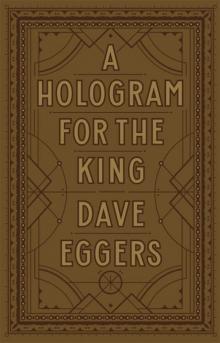 A Hologram for the King
A Hologram for the King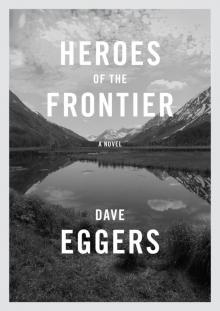 Heroes of the Frontier
Heroes of the Frontier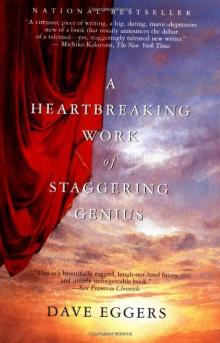 A Heartbreaking Work of Staggering Genius
A Heartbreaking Work of Staggering Genius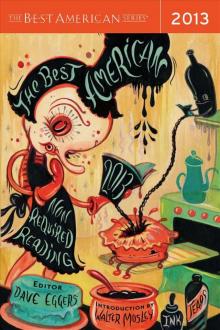 The Best American Nonrequired Reading 2013
The Best American Nonrequired Reading 2013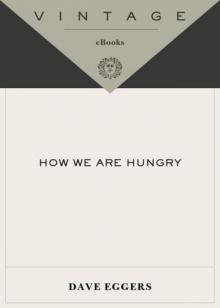 How We Are Hungry
How We Are Hungry The Circle
The Circle What is the What
What is the What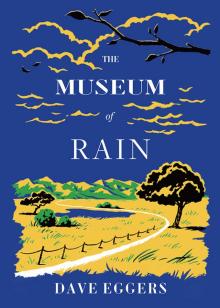 The Museum of Rain
The Museum of Rain The Captain and the Glory
The Captain and the Glory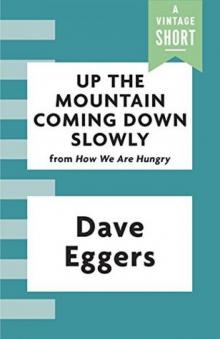 Up the Mountain Coming Down Slowly
Up the Mountain Coming Down Slowly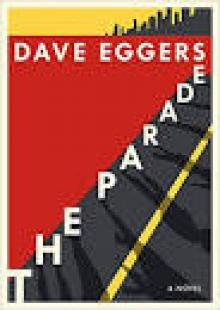 The Parade
The Parade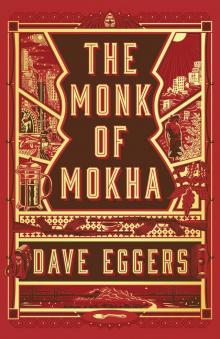 The Monk of Mokha
The Monk of Mokha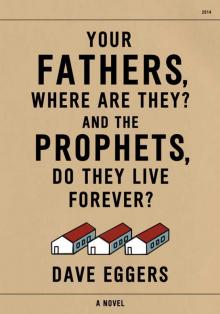 Your Fathers, Where Are They? And the Prophets, Do They Live Forever?
Your Fathers, Where Are They? And the Prophets, Do They Live Forever? You Shall Know Our Velocity
You Shall Know Our Velocity The Wild Things
The Wild Things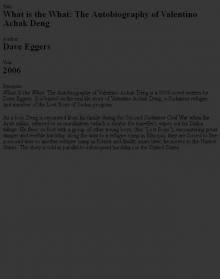 2006 - What is the What
2006 - What is the What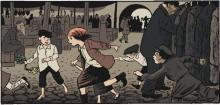 The Best American Nonrequired Reading 2011
The Best American Nonrequired Reading 2011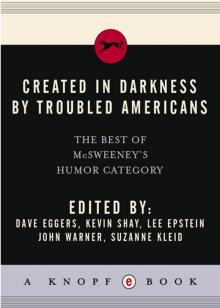 Created in Darkness by Troubled Americans
Created in Darkness by Troubled Americans